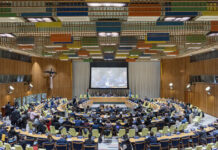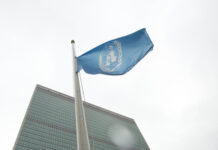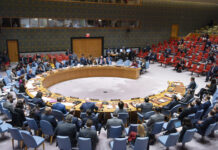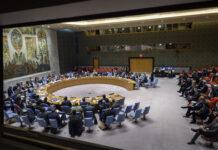Photo credit: DiasporaEngager (www.DiasporaEngager.com).
The former president of the International Court of Justice (ICJ) clarified on Thursday that the court did not rule it was “plausible” that Israel was committing genocide against the Palestinians in Gaza.
Joan Donoghue, who was president of the ICJ when the preliminary ruling was made, was asked on the BBC if the key point in the January ruling was that it was plausible Israel was committing genocide against the Palestinians.
“It did not decide, and this is something where I’m correcting something that’s often said in the media,” she responded. “It did not decide that the claim of genocide was plausible.”
Rather, she explained, the court ruled on two things pertaining to the question of genocide. First, “the Palestinians had a plausible right to be protected from genocide,” and second, that “South Africa had a right to present that in the court.”
In other words, they were answering procedural questions rather than substantive ones.
Joan O’Donoghue, President of Int’l Court of Justice when it made its Provisional Measures Order in SA’s case v. Israel alleging genocide, has confirmed it did not decide that SA’s claim of genocide was plausible: pic.twitter.com/MCNDw0yloS
— UK Lawyers For Israel (@UKLFI) April 25, 2024
Donoghue’s correction may have been necessary because, after the preliminary ruling, many observers began claiming the ICJ found Israel was “plausibly” committing genocide. An NPR article in late January, for example, was titled “A top UN court says Gaza genocide is ‘plausible’ but does not order cease-fire.”
Francesca Albanese, the UN’a special rapporteur on the human rights situation in the Palestinian territories, claimed the ICJ “just recognized that the horror in Gaza plausibly constitutes genocide.”
The statement from Donoghue appeared to stand in stark contrast to what was claimed.
Still, others have said her new statement did not actually debunk that interpretation. Kenneth Roth, former executive director at Human Rights Watch, wrote on X/Twitter that Donoghue said “everyone has a right to be protected from genocide” and that “the court found it plausible that Palestinians’ right was in jeopardy.” Therefore, he argued, “that means it’s plausible that Israel is committing genocide.”
However, Donoghue’s statement was relatively clear. She added at the end: “The shorthand that often appears — that there’s a plausible case of genocide — isn’t what the court decided.”
Seemingly responding to that claim, Roth argued that, either way, “Donoghue isn’t on the court anymore, so her revisionist reinterpretation of the Gaza judgment doesn’t matter.”
Prior to the preliminary decision being handed down, 210 members of the US House of Representatives signed a letter arguing, “South Africa’s accusation of genocide against Israel exposes how far Israel’s enemies will go in their attempts to demonize the Jewish state.”
“While barely acknowledging the Hamas terrorists who gleefully massacred, mutilated, raped, and kidnapped innocent civilians on Oct. 7, South Africa makes grossly unfounded and defamatory charges against Israel on the world stage, abusing the judicial process in order to delegitimize the democratic State of Israel,” the letter argued.
Many Jews, including those in South Africa, welcomed the ICJ ruling because it did not impose a unilateral ceasefire in Gaza — which would have been an unprecedented step — and, more importantly, called for the release of the hundreds of hostages taken by the Hamas terrorist organization during its Oct. 7 attack on Israel.
“The court’s call for the hostages to be freed is a fundamental requirement for the end of the conflict,” the South African Jewish Board of Deputies said at the time. “It is regrettable that the South African government did not put pressure on Hamas to release the hostages from the outset, which would have averted such terrible loss of life.”
In December, South Africa hosted two Hamas officials who attended a government-sponsored conference in solidarity with the Palestinians. One of the officials had been sanctioned by the US government for his role with the terrorist organization.
Source of original article: World – Algemeiner.com (www.algemeiner.com).
The content of this article does not necessarily reflect the views or opinion of Global Diaspora News (www.GlobalDiasporaNews.com).
To submit your press release: (https://www.GlobalDiasporaNews.com/pr).
To advertise on Global Diaspora News: (www.GlobalDiasporaNews.com/ads).
Sign up to Global Diaspora News newsletter (https://www.GlobalDiasporaNews.com/newsletter/) to start receiving updates and opportunities directly in your email inbox for free.
































